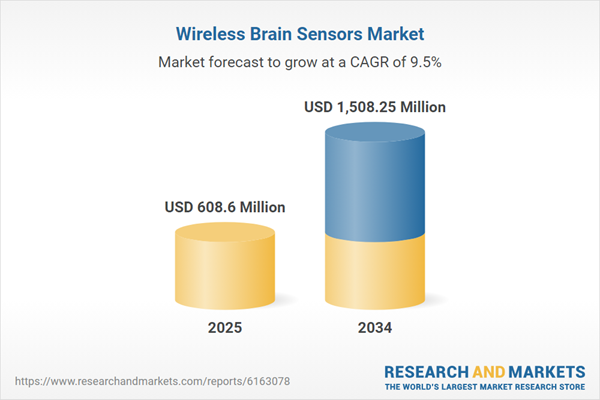Wireless Brain Sensors: Introduction
Tools that are used to measure pressure inside the brain, brain temperature, and brain activity, and pH as ‘brain waves' that represent electrical transmission within the brain are known as wireless brain sensors. The term ‘brain-computer interface' (BCI) refers to a type of neural interface that enables continuous monitoring of the electrical activity of the brain throughout the day and wireless transmission of the data from the brain to outside analyzing devices. These areimportant to communicate with the brain, as in brain-computer prosthesis, and to better understand how the brain functions. To detect or treat neuropsychiatric diseases, the brain-computer interface can be utilized to analyze or generate these cerebral electrical impulses.Global Wireless Brain Sensors Market Analysis
The use of innovative technology in the development of these consumer-grade EEG gadgets increases its potential and performing competence. These devices are expected to be used beyond hospitals and laboratories in future to examine the execution through research projects involving multiple disciplines. Wireless brain sensors provide the benefit of wireless connections that allows patients to move freely and experience convenient monitoring in both clinical and research settings. Such benefits have created a high demand for non-invasive brain monitoring technologies among people and healthcare professionals, further propelling the global wireless brain sensors market demand.Additionally, wireless brain sensors are undergoing continuous advancements in miniaturization and wearable designs, leading to the development of compact and lightweight devices that are comfortable to wear on the scalp or integrated into headbands, hats, or other wearable accessories are further propelling the market growth. Applications in neurorehabilitation, assistive technologies, and improving human-computer interactions are made possible by the use of wireless sensors in brain-computer interfaces (BCIs).
The wireless brain sensors market growth is likely to be driven by the rapid technological advances in BCIs. Wireless brain sensors are increasingly being integrated into the Internet of Things (IoT) ecosystem to achieve seamless data transmission, remote monitoring, and real-time analysis, contributing to the growth of the market.
Global Wireless Brain Sensors Market Segmentations
Wireless Brain Sensors Market Report and Forecast 2025-2034 offers a detailed analysis of the market based on the following segments:Market Breakup by Product
- Electroencephalography (EEG) Devices
- Sleep Monitoring Devices
- Magnetoencephalography (MEG) Devices
- Others
Market Breakup by Disease
- Alzheimer's Disease
- Traumatic Brain Injury
- Epilepsy
- Sleep Disorders
- Others
Market Breakup by End User
- Hospitals
- Research and Academic Institute/Laboratories
- Homecare Settings
- Others
Market Breakup by Region
- North America
- Europe
- Asia Pacific
- Latin America
- Middle East and Africa
Global Wireless Brain Sensors Market Overview
The increasing popularity of wireless brain sensors due to the growing desire for non-invasive and patient-centric brain monitoring solutions is primarily driving the wireless brain sensor market growth. The rapid improvements in wearable and miniaturisation technologies enable the creation of small, convenient sensor designs, which improve user comfort and encourage long-term monitoring, driving the market demand. The increasing need for wireless brain sensors in research and clinical settings is also fuelled by the expanding emphasis on neuroscience research and the requirement for real-time data on brain activity, which is directly contributing to the wireless brain sensor market share.Additionally, the seamless data transfer, remote monitoring, and analysis, made possible by the integration of wireless sensors with cutting-edge technologies like the Internet of Things (IoT) and cloud computing is further aiding the development of the market. Increasing collaborations and partnerships between academic institutions, tech organizations, and healthcare providers foster innovation and accelerate the development of advanced wireless brain sensors further propelling the market growth.
Global Wireless Brain Sensors Market: Competitor Landscape
The key features of the market report include patent analysis, grants analysis, clinical trials analysis, funding and investment analysis, partnerships, and collaborations analysis by the leading key players. The major companies in the market are as follows:- NeuroSky
- Emotiv
- Advanced Brain Monitoring
- Koninklijke Philips N.V.
- Medtronic Corporation
- Muse
- Natus Medical Incorporated
- Cadwell Industries
- NeuroWave Systems Inc.
- BrainScope
This product will be delivered within 3-5 business days.
Table of Contents
Companies Mentioned
- NeuroSky
- Emotiv
- Advanced Brain Monitoring
- Koninklijke Philips N.V.
- Medtronic Corporation
- Muse
- Natus Medical Incorporated
- Cadwell Industries
- NeuroWave Systems Inc.
- BrainScope
Table Information
| Report Attribute | Details |
|---|---|
| No. of Pages | 350 |
| Published | July 2025 |
| Forecast Period | 2025 - 2034 |
| Estimated Market Value ( USD | $ 608.6 Million |
| Forecasted Market Value ( USD | $ 1508.25 Million |
| Compound Annual Growth Rate | 9.5% |
| Regions Covered | Global |
| No. of Companies Mentioned | 10 |









